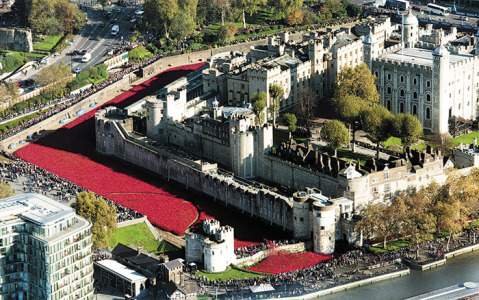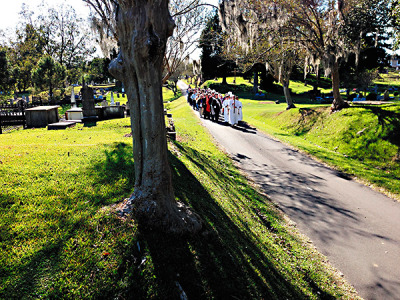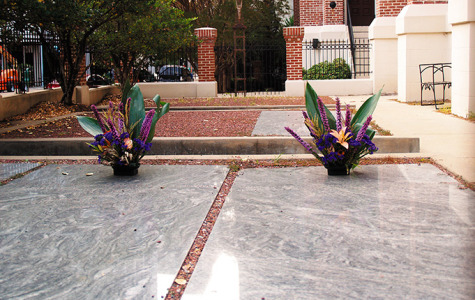By Mary Woodward
We are well into another November as 2014 marches on to its end. The Church traditionally honors the dead during this month. In our diocese we place the names of family and friends who have gone on before us marked with the sign of faith beneath the altar in St. Peter Cathedral. After the All Souls Mass, cathedral altar servers placed flowers on the graves of Bishops Richard Gerow and Joseph Brunini who are buried outside the cathedral in a cemetery for bishops.

An aerial view shows visitors looking at the Tower of London’s poppy installation in London Nov. 4. The ceramic poppies symbolize the end of World War I and Remembrance Day, Nov. 11. (CNS photo/Hannah McKay, EPA)
In Natchez on the Feast of All Souls, parishioners processed to Catholic Hill in the city cemetery and prayed around the graves of their ancestors in the faith. This year they honored Msgr. Daniel O’Beirne, who served in Natchez, Vicksburg and as Chancellor of the diocese. He was a great assistant to Bishop Richard Gerow in developing the vast archives for the diocese.
Other parishes and schools throughout the diocese marked All Saints Day with festive costumes for children mimicking favorite saints – it seems as always the Blessed Mother, St. Joseph and St. Francis were the most popular.
In November we also remember our veterans on the11th, this past Tuesday. Veterans Day honors all those who have served in the military and recognizes those still serving who will one day become veterans – please God.
This year marks the 100th anniversary of the beginning of World War I, the Great War and supposedly the war to end all wars. Unfortunately, it did not.
There was a news story on the other night which featured the red poppies immortalized in Canadian doctor, soldier and poet John McCrae’s poem written during WWI in 1915 – “In Flanders Fields.”

Natchez St. Mary Basilica parishioners process to Catholic Hill in the City Cemetery on Sunday, Nov. 2, the Feast of All Souls to pray and remember their Catholic ancestors. November is the month in which we honor the dead.(Photo by Patricia Murphy)
Poppies were the first signs of vegetation to grow again after the horrors of battles and death. Often “popping” up between graves on newly buried soldiers. The first stanza of the short poem sings:
In Flanders Fields the poppies blow
Between the crosses row on row,
That mark our place; and in the sky
The larks, still bravely singing, fly
Scarce heard amid the guns below.
Varied stories are told about the writing of the poem and its publication, but in England this year to honor the 888,246 fallen soldiers from that country and its colonies in WWI, artists made 888,246 ceramic red poppies and placed them around the dry moat of the Tower of London with the help of countless volunteers in a process that took months. The moat was filled with a sea of red which could be seen from thousands of feet in the sky. It appears as a river of blood flowing around and out of the fortress.
No one knows exactly how many died in combat and from disease in the war to end all wars. Estimates go from six million to upwards of 15 million – this total includes Colonel John McCrae who after many years of treating the wounded himself died of pneumonia in 1918 in a military hospital.
Europe lost almost an entire generation of young men, who never came home to marry and start families. The Great War marked the end to horseback sword wielding battle charges and opened the door to weapons of mass destruction.

Flowers mark the graves of Bishops Richard Gerow and Joseph Brunini in the Bishops’ Cemetery outside St. Peter Cathedral in Jackson. (Photo by Mary Woodward)
And in that moat 888,246 lives are remembered – lives lost to a brutal war that left families and futures destroyed and landscapes scarred with trenches, barbed-wire and flowing blood. And in the cycle of nature, the poppies continue to grow and blow amidst this tragic human endeavor.
This November, I remember in a special way both my grandfathers one of whom spent 22 months as an artillery man in France during WWI and the other who wanted desperately to fight in this war but was caught in the worldwide flu epidemic of 1917 and never made it to foreign shores. I often wonder would I be here if he had made it to fight. So during this month honoring the dead take some time to remember all those among family and friends who have gone on before us and also offer up some prayers for those who have no one to remember them.
Eternal rest grant unto them, O Lord, and let perpetual light shine upon them. Requiescant in pace.
